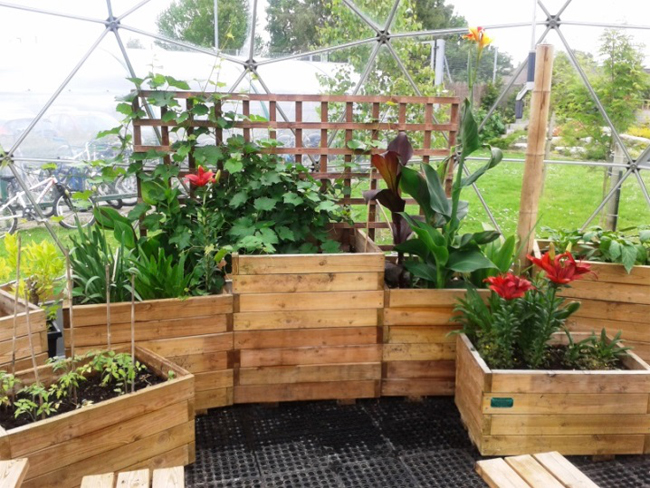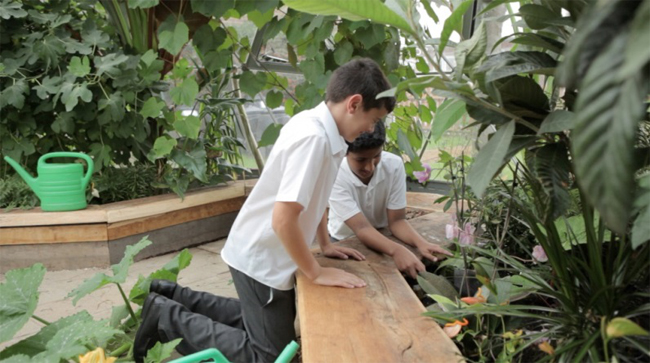The importance of outdoor learning is well documented, most notably, by OFSTED. Furthermore, The Royal Horticultural Society states that ‘the lives of children could be radically improved by teaching them horticultural skills and encouraging them to get active in the garden.’
There seems to be no dispute that getting children outside to learn and getting them involved in gardening is beneficial on many levels. And with a greater emphasis on horticulture on the National Curriculum from September 2014, now is the time for schools to get gardening. Whether you create a small growing area, introduce some raised planters or invest in a larger ecology project, allotment or community garden, it will be a worthwhile venture.
Overcoming the barriers
Cost
Garden projects do not need to be on a grand scale or require significant investment. You can start small and simple with raised beds or planters, perhaps with each class in the school responsible for their own garden box and allocated crop.

However, if you are thinking bigger but don’t have the funds, there are a number of organisations that can provide financial support. It’s also the perfect project to inspire creative community fundraising drives and initiatives.
And once your garden is established, some of these costs can be recouped. At Wellacre Academy in Manchester, the produce grown in their Eco Centre is sold annually at the school fair and used by the academy’s food technology department.
Space
Lack of green space shouldn’t prevent you from gardening. Planters and window boxes don’t take up much room and you’ll be amazed at what can be achieved in a small corner of the playground. Hackney, London, is not known for its green space, but at the back of the school playground at The Petchey Academy, is a glasshouse, which has become an integral part of their learning and provides the ideal space for practical STEM projects.
Gardening all year round
There are a variety of innovative and practical solutions that means growing can be part of school life all year round. You may have a covered outside area or wish to invest in a glasshouse or greenhouse. Newquay Tretherras School in Cornwall created their own mini Eden style project with a geodesic glass dome protecting them from the weather and providing them with a great environment to create a rainforest and study various STEM topics.

How a garden can be integrated into a creative curriculum
Far from being an add-on to the curriculum, your school garden or eco project can be central to it. Whether it’s the STEM subjects, geography, history or art, they can all be approached practically through gardening.
Integrating the outdoors into the curriculum is an achievable goal. Desmond Anderson Primary School in West Sussex demonstrates this by embedding the outdoors with key development and learning goals of the Early Years Foundation Stage.
Maths can include lessons in counting with seed germination, leaf numbers and seed planting. Science can be applied practically, with pupils identifying different parts of the plant, experimenting with different growing conditions and learning about life cycles and photosynthesis. Design and technology can be integrated through the planning and design stages of a garden and then construction of raised beds or other planters. Pupils can learn about climate change, recycling and sustainability, all through growing. Gardens also provide inspiration for creative writing and art, and the opportunity to learn about food, nutrition, diet and where food comes from.

Make it your school project for 2014
Now is the time to invest in your own school garden project. It is proven to deliver benefits and gives young people the chance to learn in a new, relevant and exciting way, without having to leave the school grounds. It aids the learning of all students, particularly those who struggle with traditional classroom teaching, and because it is practical and hands-on it is particularly appropriate to the visual and tactile learning styles of many pupils with Special Educational Needs. It can be fully integrated into an exciting curriculum, and whether you start small or aim big, you’ll be surprised at how engaged pupils will become. Gardening clubs, eco warriors, and compost monitors are all examples of initiatives that can be borne out of such a venture. And with local and national awards recognising green initiatives, such as forest and eco schools, your school can become a shining example of truly inspirational teaching.


















